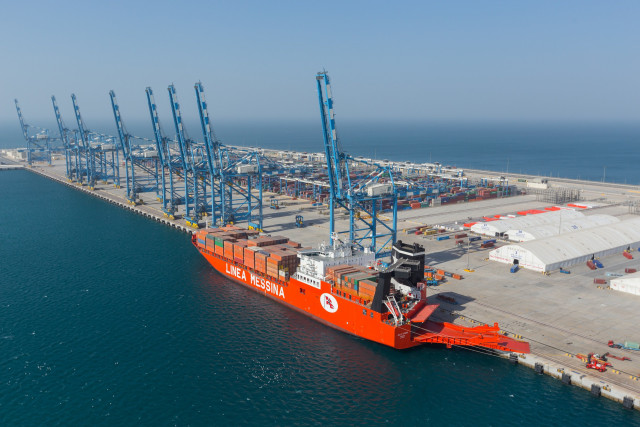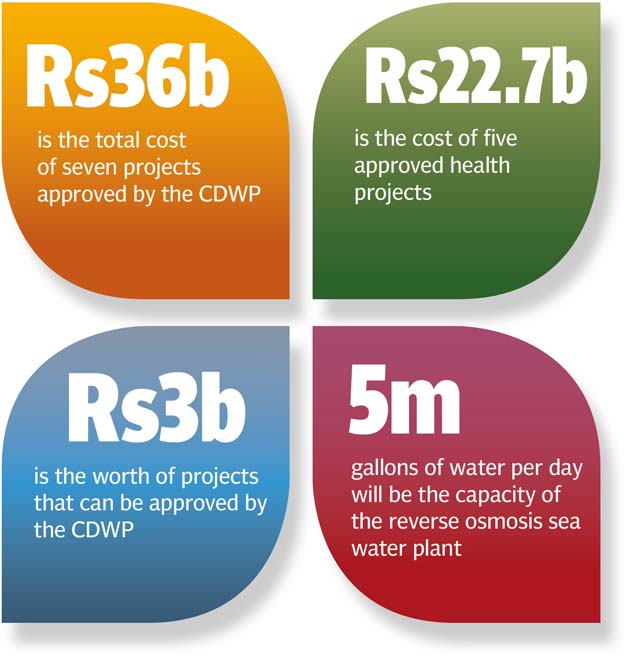CDWP green-lights Gwadar water purification plant
Costing Rs5.1b, the scheme was cleared to pave the way for arranging finances

PHOTO: AFP
The Central Development Working Party (CDWP) cleared the scheme to enable the implementation agency to arrange finances for the Reverse Osmosis Sea Water Plant. Initial cost of the project has been estimated at Rs5.1 billion, which may change as it has been worked out without a detailed engineering design.
Gwadar Port to begin trade activities today
Overall, the CDWP approved seven projects worth Rs36 billion, including four projects costing Rs30 billion that were referred to the Executive Committee of National Economic Council (Ecnec) for final approval. The CDWP has powers to approve up to Rs3 billion worth of projects.
It constituted a committee, headed by Member Infrastructure Planning Commission Malik Ahmad Khan, to examine the Reverse Osmosis Sea Water Plant project.
The water purification plant is part of Early Harvest Projects of the CPEC. The government plans to make it part of the CPEC Framework Agreement. It has not allocated any funds for the project in the current fiscal year’s Public Sector Development Programme.
The CDWP cleared the scheme in order to finalise financing arrangements. It has been estimated that China will provide 90% of the financing.
The plant will have a capacity to supply five million gallons of water per day to the Gwadar city, which will meet over one-third of the requirement. Reverse osmosis is a water purification technology that uses a semi-permeable membrane to remove ions, molecules and large particles from the drinking water.
The city’s total water requirement has been estimated at 14 million gallons per day. At present, two million gallons are being supplied from the Ankara Kaur Dam and two million gallons from the Balochistan Development Authority’s desalination plant.
However, the government has had a bitter experience of running desalination plants and there is a possibility the new plant will be handed over to a private investor on a turnkey basis, said an official of the planning ministry.
Additional health plans
The CDWP approved five health projects valuing Rs22.7 billion. It referred Sindh’s immunisation support programme costing Rs8 billion to Ecnec for approval.
It also sent two projects of Khyber-Pakhtunkhwa and Balochistan to Ecnec. These are expanded immunisation programmes worth Rs6.6 billion for Khyber-Pakhtunkhwa and Rs7.3 billion for Balochistan.
All the three immunisation projects are aimed at preventing children from nine diseases including childhood tuberculosis, poliomyelitis, diphtheria, pertussis, tetanus, hepatitis-B, haemophilus influenza, measles and pneumonia.

The meeting approved the establishment of a unit for shredding, sterilisation and disposal of medical waste of the Pakistan Institute of Medical Sciences (PIMS) Islamabad at a cost of Rs199 million. It also approved the establishment of a children’s hospital in Bahawalpur costing Rs519 million.
Gwadar Port to begin trade activities today
It recommended the seventh secondary transmission and grid station project worth Rs8.6 billion to Ecnec. The project will provide adequate facilities for reliable and stable supply of electrical power to meet the growing demand of domestic, commercial, industrial and agricultural customers of Gujranwala Power Distribution Company.
The CDWP also approved three position papers including that for the extension of Right Bank Outfall Drain (RBOD) from Sehwan to the sea at a cost of Rs61.9 billion, Balochistan effluent disposal into the RBOD worth Rs10.8 billion and Lower Indus Right Bank Irrigation and Drainage Project stage-1 worth Rs17.5 billion. These projects are already at the implementation stage and are examples of poor project management. Their execution began during the General Musharraf’s tenure. Implementation agencies launched the schemes without proper designs, resulting in frequent changes in their cost and scope.
Published in The Express Tribune, November 30th, 2016.
Like Business on Facebook, follow @TribuneBiz on Twitter to stay informed and join in the conversation.



















COMMENTS
Comments are moderated and generally will be posted if they are on-topic and not abusive.
For more information, please see our Comments FAQ